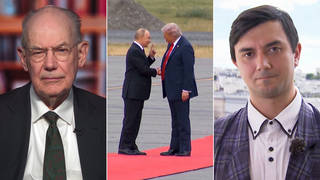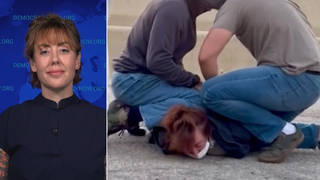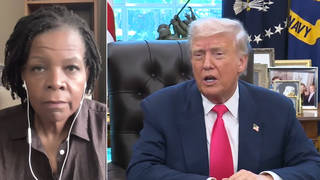
Guests
- Wally Bowenexecutive director, Mountain Area Information Network, a nonprofit Internet service provider that offers Internet service in western North Carolina. It is based in Asheville, North Carolina. He is also the founder of the low-power FM station WPVM.
- Craig Aaroncommunications director at Free Press, a media reform organization.
Links
The Federal Communications Commission has approved a set of rules to auction off a sizable chunk of the public airwaves. These rules will likely affect the lives of everyone in this country that uses the Internet and mobile phones. Craig Aaron of Free Press and Wally Bowen of the nonprofit Internet service provider Mountain Area Information Network explain. [includes rush transcript]
Transcript
AMY GOODMAN: As we talk about media consolidation, I wanted to go to a new issue. As Rupert Murdoch’s purchase of Dow Jones and The Wall Street Journal dominated headlines this week, another media story of great significance has been overshadowed: The Federal Communications Commission has approved a set of rules to auction off a sizable chunk of the public airwaves. These rules will guide how the FCC sells licenses to use the public airwaves for wireless phones and Internet access.
This story might not have made the front page of your local newspaper, but the FCC’s actions will likely affect the lives of everyone in this country that uses the Internet and mobile phones.
To explain what the FCC is doing, Craig Aaron is still with us in Chicago, communications director of Free Press. We’re also joined by Wally Bowen. He’s executive director of the Mountain Area Information Network, a nonprofit Internet service provider that offers Internet service in western North Carolina. He’s also the founder of the low-power FM station WPVM.
We’re going to start with Craig Aaron. Describe what happened this week at the FCC?
CRAIG AARON: What happened this week at the FCC, Amy, is that the commission really squandered a historic opportunity to bring the benefits of broadband, of high-speed Internet access to all Americans. They voted, they set some auction rules for the auction next year of an incredibly valuable slice of the public airwaves that is being returned to the government and will be sold to the highest bidder sometime next year. This slice of the airwaves coming back from the television broadcasters would allow high-speed wireless Internet access. It has properties that would vastly improve what you might think of now as wi-fi or, you know, the local little bubble at your coffee shop. This was really an opportunity, maybe our last and best opportunity, to introduce a third competitor, true, real competition, into the market that is so dominated, over 96 percent dominated, by the phone and cable companies.
AMY GOODMAN: Wally Bowen, can you explain the practical application of this in the kind of work that you do? Wally Bowen, joining us from North Carolina on the telephone.
WALLY BOWEN: Yes. Thanks, Amy. Absolutely. We’re a nonprofit Internet service provider and community network here in the mountains of North Carolina, based in Asheville, and we deliver high-speed Internet using the unlicensed part of the spectrum in the 900-megahertz range. And it has been terrific, because so many people cannot get high speed through DSL or a cable line.
The problem is, is that this unlicensed spectrum that we use will not penetrate buildings, it will not bend around mountain ridges. And so, a lot of people who really would like to have an alternative to the cable-telco duopoly can’t get our service. And that’s why this 700-megahertz spectrum was so critical to our future and the future of independent media in this country, because what we’ve done is to create an integrated nonprofit business model, where we’re giving citizens the option of spending their Internet dollars to support local independent media, such as our radio station WPVM.
We’re going to continue working in the unlicensed band that we have available, but it’s becoming crowded and problematic. Had we been able to get access to the 700-megahertz spectrum that the auction rules were set for earlier this week, we would be able to deliver high-speed wireless throughout the mountain region, regardless of ridges, buildings or how remote some of our citizens and small businesses are.
I was very concerned about how this issue was framed in the media coverage. It was framed as, well, you’ll be able — because of open access, you’ll be able to move your cellphone from one carrier to another. The idea that this would create a third pipe, an alternative to the cable-telco duopoly, was really submerged in the coverage, and what this means for rural America.
I know from having spent a lot of time in the North Carolina Legislature the last year or two on some of these issues that regardless of ideological stripe, legislators, elected officials at the local level, are extremely concerned about access to affordable broadband. And I think we missed a great opportunity to rally members of Congress from rural America, our elected officials in state capitals and local governments, to put pressure on the FCC. And I think we have to learn from, you know, our inability to do that, moving forward. I’m also hopeful that Congress could still act. These auctions have been delayed before and have been canceled, so I’m not giving up on the hope that Congress could step in and stop this auction from moving forward.
AMY GOODMAN: Craig, what do you think about that?
CRAIG AARON: Well, there was immense public pressure. I think, you know, one of the issues here is that, you know, this has been framed, as Wally mentioned, in the press as some kind of conflict, a clash of the titans between AT&T and Google or Verizon and Yahoo! But the simple fact is that a quarter-million Americans filed public comments with the FCC on this, you know, highly technical issue of a spectrum auction. There was, you know, widespread — for an issue like this — public involvement and growing awareness. You know, unfortunately, our media policy-making process has become so corrupted by big money, both in terms of what’s going on with the News Corp. deal and this spectrum auction, that it came down to, you know, a few votes with commissioners at the FCC that really did miss an opportunity.
This device portability, unlocking devices, that they did agree to is a small step forward for consumers, but failing to guarantee true open access that would create real competition for broadband, using the same policies that have succeeded elsewhere in the world. You know, the United States is falling further and further behind the rest of the world when it comes to broadband accessibility. We used to be fourth in the world in 2001. Six months ago, we were twelfth. Now we’ve dropped to 15th in the world, according to the OECD, in broadband penetration. And that’s a direct result of our complete lack of a national broadband policy. And so, it really is incumbent upon Congress, upon whoever is in the White House next, to begin to answer these problems.
President Bush said that we were supposed to have universal affordable broadband access by 2007. Here we are. We’re not even close. And the digital divide is growing, and yet our policymakers in Washington, rather than tackling this problem, rather looking elsewhere, looking at past successes to try to create an auction that would actually bring new competitors in the market, create lots of different options for broadband, instead they’ve decided to really reward the biggest phone companies, AT&T and Verizon, by the way they’ve structured this auction. And it’s going to be very hard to create that third pipe that we so desperately need.
I don’t think it’s over. I think Congress can step in. I think they can begin to push forward. But if we don’t do it soon, we’ll really miss a tremendous opportunity that’s going to shape our entire communications system for a generation.
AMY GOODMAN: Thirty seconds, Craig, and that is this Free the iPhone campaign that Free Press has been waging. In a nutshell, what is it?
CRAIG AARON: Well, we’re trying to capitalize on the awareness of this great new device, the iPhone, and to show that, hey, wouldn’t it be great if you could actually use this iPhone no matter what kind of service you have? Unfortunately, you can’t. If you get an iPhone, you’re completely locked to AT&T. That’s a way to think about, you know, why is it that way? You know, if you buy a television, the cable company doesn’t ask you what kind of TV you have before they’ll hook you up. It should be the same way with the wireless Internet.
And this Free the iPhone campaign is just really an effort to bring more people into these important policy issues. On all of these media issues, what we need is greater public involvement and awareness. And we’re beginning to see the start of that, I think, on all of these issues, but we need a lot more. So I encourage people to check out freetheiphone.org, freepress.net, lots of great information about how to get involved, how to make media a political issue so that our members of Congress, so that the regulators at the FCC, cannot continue to ignore the public interest and just do the bidding of the big corporations.
AMY GOODMAN: Craig Aaron, I want to thank you for being with us, and Wally Bowen, as well, executive director of the Mountain Area Information Network, the nonprofit Internet service provider that offers Internet service in western North Carolina, founder also of the low-power FM station WPVM.












Media Options